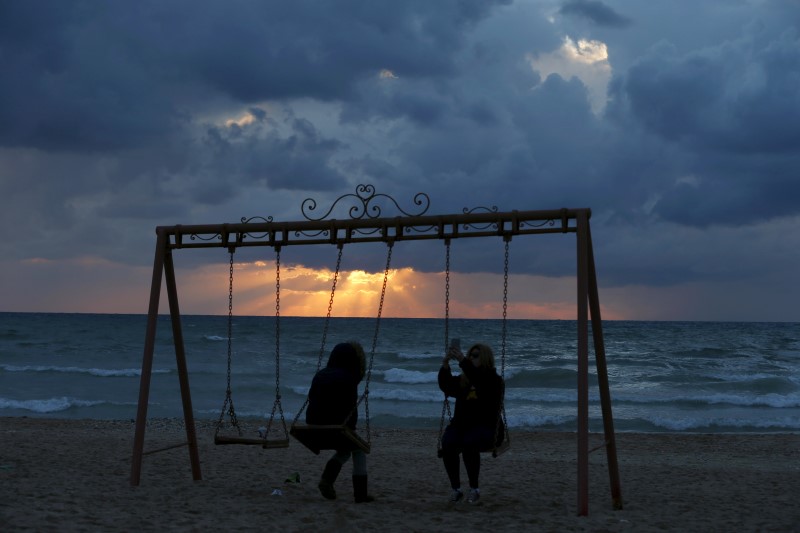By Ruth Pollard
BEIRUT (Thomson Reuters Foundation) - When her teenage daughter – a talented football player – was selected for a national Lebanese team, Nadine Moussa could not have been more proud.
But the celebrations were short-lived.
Under a 91-year-old law, women like Moussa, who are married to foreigners, cannot pass their Lebanese nationality on to their husbands or children - nor can they inherit or own property.
"She was selected and then told she was not allowed on the team because she is not Lebanese," Moussa said. "She was devastated … she stopped playing football after that, she felt rejected and excluded."
Her two daughters, who have always lived in Lebanon, cannot access public health or education and when they are old enough, they cannot work without a permit, according to the law.
Nor can Moussa pass on the family property or land due to strict limits in Lebanon on the amount of property those who are classed as foreigners, such as her daughters, can own.
"I have always felt like a second-class citizen, being deprived of the right to give my nationality to my children and my family, said Moussa, a lawyer, long-time activist and Lebanon's first female presidential candidate.
The law affects more than 77,000 people, a 2009 study, Predicament of Lebanese Women Married to Non-Lebanese, found.
The issue is even more complicated for Lebanese women married to Palestinian men, because Palestinians are denied the right to own any property in Lebanon.
It is 14 years since the campaign to reform nationality laws across the Middle East was launched.
Since then, most Arab countries, including Saudi Arabia, have either partially or completely reformed their nationality laws, the executive director of the Collective for Research and Training on Development Action, Lina Abou Habib, said.
"Although Lebanon boasts of being way more liberal than other Arab countries, it has not yet done any reform in this area," Abou Habib told the Thomson Reuters Foundation.
Government officials were not immediately available for comment.
DELICATE BALANCE
The country's mostly male politicians offer a standard set of arguments against allowing women to pass on their nationality to their foreign husbands and children, she said.
"They say if you reform the law then all Palestinian men will marry Lebanese women and they will never return to Palestine, thereby taking away the right of Palestinian refugees to return home," Abou Habib said.
The United Nations estimates there are 450,000 Palestinian refugees registered in Lebanon.
They have limited rights, cannot own property and are prevented from working in 20 nominated professions, according to the United Nations.
Opponents argue that Lebanon maintains a delicate religious balance between Christians, Sunnis, Shi'ite and Druze.
They say if women were to gain nationality rights, it would mean Muslims would further outnumber Christians, threatening the existence of Christians in Lebanon.
And with the Syrian crisis now entering its sixth year and Syrian refugees making up one-quarter of Lebanon's population, some also argue if women have the right to nationality, Syrian men will marry Lebanese women and never return to Syria.
Abou Habib, and all activists interviewed for this story, reject these arguments as racist and say they are exploiting sectarian fears in order to deny women their rights.
"There is no link between women's nationality and the issue of Palestine or the country's religious make-up or the Syrian crisis," she said.
"At the end of the day, what is true is that the state does not recognise women as citizens."
INHERITANCE DENIED
Not all political parties and coalitions share the same view on women's nationality – it is split between the Christian parties who oppose it and the Muslim parties who support it, Abou Habib said.
Complicating the campaign is the fact that Lebanon has been without a president since May 25, 2014, essentially paralysing its parliament and reducing the chance of political reform.
"The issue doesn't disappear if there is no president or because we have the added complication of the Syrian displacement," Abou Habib said. "The issue is still there, women are still suffering."
Property transfer is not only governed by state laws, but by religious laws as well. There are 18 recognised confessions or religions in Lebanon and laws prevent the transfer of property between confessions.
Abou Habib offers her experience as an example.
Although she is an avowed secularist, her father's Greek Orthodox religion is listed on her identity card. She is married to a Sunni man, so via the patrilineal rules associated with religious identity in Lebanon, their daughter is also Sunni.
"She cannot even inherit my car because she is a different confession," Abou Habib said.
"You have the combination of the property law which is already discriminatory and religious family laws which are a disaster in their own right."
The law issued under the French Mandate of Lebanon in 1925 states that a person is considered Lebanese if born to a Lebanese father.
Nada Makki, a project officer from the Committee for the Follow-Up on Women's Issues who worked on the 1999 study said many women were not aware that this law prevented them from passing their nationality onto their children.
"It is not until their children cannot access public health care or education, a special problem for low income families, that they realise what they are being denied because of this law," Makki said.
"Of course, there is the inheritance – for women who have land and housing they do not have the right to pass this on to their children."
Foreign Minister Gebran Bassil, who leads Christian party, The Free Patriotic Movement, has voiced some of the loudest opposition to the reform of Lebanon's nationality laws.
Last November, he sponsored a bill that would grant citizenship to Lebanese expatriates but not to the spouses of Lebanese women.

He did not return calls from Thomson Reuters.